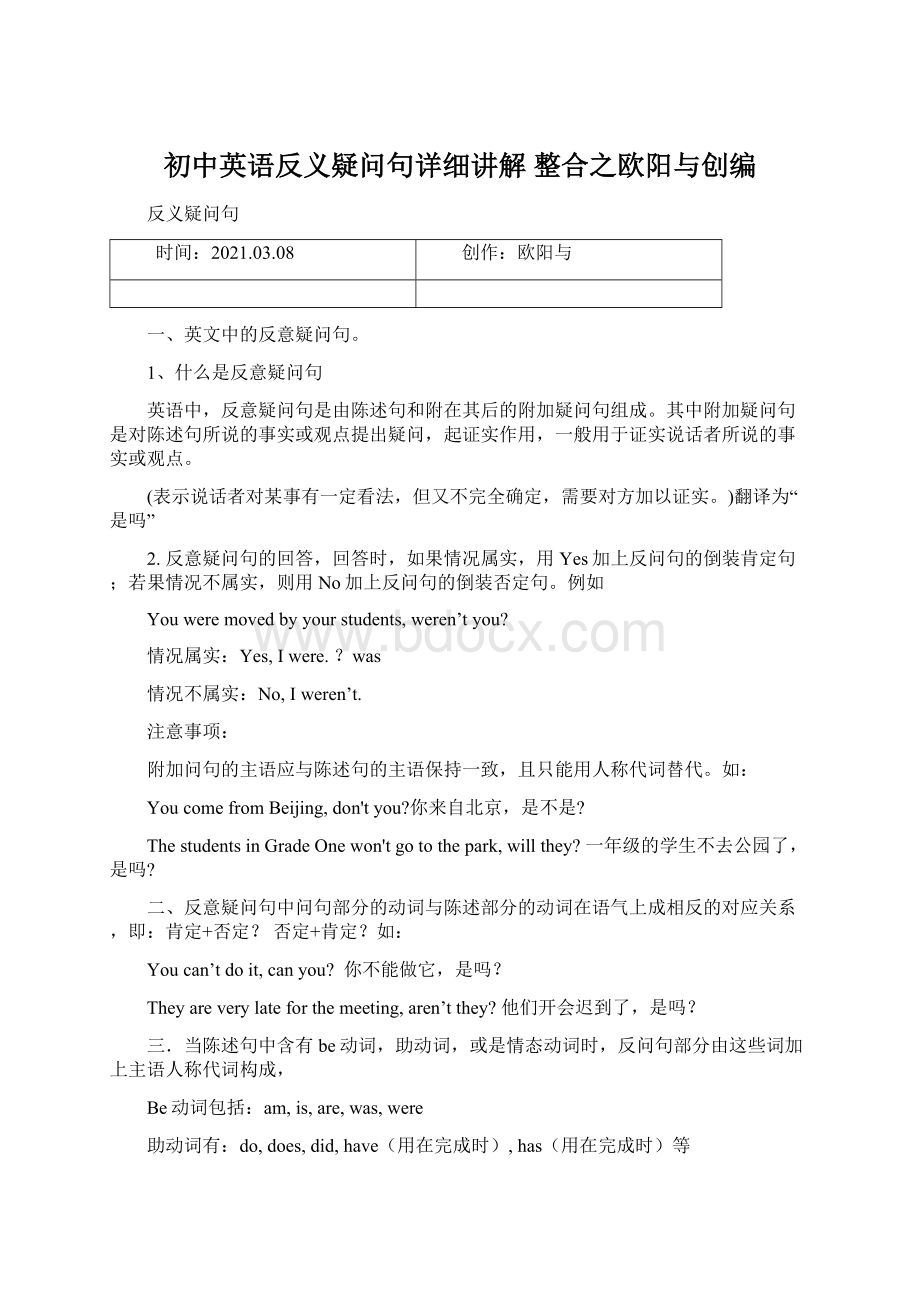初中英语反义疑问句详细讲解整合之欧阳与创编.docx
《初中英语反义疑问句详细讲解整合之欧阳与创编.docx》由会员分享,可在线阅读,更多相关《初中英语反义疑问句详细讲解整合之欧阳与创编.docx(8页珍藏版)》请在冰豆网上搜索。

初中英语反义疑问句详细讲解整合之欧阳与创编
反义疑问句
时间:
2021.03.08
创作:
欧阳与
一、英文中的反意疑问句。
1、什么是反意疑问句
英语中,反意疑问句是由陈述句和附在其后的附加疑问句组成。
其中附加疑问句是对陈述句所说的事实或观点提出疑问,起证实作用,一般用于证实说话者所说的事实或观点。
(表示说话者对某事有一定看法,但又不完全确定,需要对方加以证实。
)翻译为“是吗”
2.反意疑问句的回答,回答时,如果情况属实,用Yes加上反问句的倒装肯定句;若果情况不属实,则用No加上反问句的倒装否定句。
例如
Youweremovedbyyourstudents,weren’tyou?
情况属实:
Yes,Iwere.?
was
情况不属实:
No,Iweren’t.
注意事项:
附加问句的主语应与陈述句的主语保持一致,且只能用人称代词替代。
如:
YoucomefromBeijing,don'tyou?
你来自北京,是不是?
ThestudentsinGradeOnewon'tgotothepark,willthey?
一年级的学生不去公园了,是吗?
二、反意疑问句中问句部分的动词与陈述部分的动词在语气上成相反的对应关系,即:
肯定+否定?
否定+肯定?
如:
Youcan’tdoit,canyou?
你不能做它,是吗?
Theyareverylateforthemeeting,aren’tthey?
他们开会迟到了,是吗?
三.当陈述句中含有be动词,助动词,或是情态动词时,反问句部分由这些词加上主语人称代词构成,
Be动词包括:
am,is,are,was,were
助动词有:
do,does,did,have(用在完成时),has(用在完成时)等
情态动词有:
can,could,may,might,must,will,would,shall,shoul
例如:
Sheisalovelygirl,isn’tshe?
她是一个可爱的女孩,是吗?
Hewillgohome,won’the?
他要回家了,是吗?
Shedoesn’tliketoeatpopcorn,doesshe?
她不喜欢吃爆米花,是吗?
Thebabywon’tsleepearly,willit?
小宝宝睡得不早,是吗?
注意:
Hehassupperathomeeveryday,doesn’the?
(不能用hasn’the?
)
他每天在家吃晚饭,是吗?
Theyhaveknownthematter,haven’tthey?
(不能用don’tthey?
)
他们已经知道那事情了,是吗?
四.当陈述句中只含有行为动词时,若动词加了s,就用does,若动词为原形,就用do,动词为过去式,则用did,例如:
Youcleanedyourhouselastweek,didn’tyou?
你上周打扫了你的房间,是吗?
Yourfatherplaysthecomputerverywell,doesn’the?
你父亲电脑技术很好,是吗?
Theylooksohappytoday,don’tthey?
你今天看起来很高兴,是吗?
五.
(1)反意疑问句的陈述部分带有little,few,never,hardly,seldom,nobody,nothing,noone,none,neither,barely,scarcely等否定意义的词时,问句部分用肯定式。
如:
①Shenevertellsalie,doesshe?
(不用doesn’tshe?
)她从不说谎,是吗?
②Hewasseldomlate,washe?
(不用wasn’the?
)他几乎不迟到,是吗?
3.Nobody phoned while I was out, did they?
4.He is hardly able to swim, is he?
5.There is little ink in your pen, is there?
(2).含有否定含义的词在陈述部分作动词的宾语时,其反意疑问句用肯定结构,也可以用否定结构。
例如:
Yougotnothingfromhim,didyou?
你从他那儿什么也没得到,是吗?
(3)当陈述部分所含的否定词是通过加前缀或后缀构成的,其后的反意疑问句依然用否定结构。
例如:
Itisunfair,isn'tit?
这不公平,是吧?
六、反意疑问句的陈述部分为Iam……时,问句部分习惯上用aren’tI?
表示。
如:
Iamaveryhonestman,aren’tI?
我是个很诚实的人,是吗?
七.陈述部分的主语为不定代词something,anything,nothing,everything时,问句部分的主语用it。
如:
①Somethingiswrongwiththecomputer,isn’tit?
电脑有问题了,是吗?
②Nothinghashappenedtothem,hasit?
他们什么事也没发生,是吗?
八、1.陈述部分的主语为不定代词somebody(someone),anybody(anyone),nobody(noone),everybody(everyone)none,neither时,问句部分的主语用he或they,这时问句动词的数应和he或they一致。
如:
Someonehastakentheseat,hasn’the?
有人已经坐了位置,是吗?
Everyonehasdonetheirbestinthegame,haven’tthey?
.每个人在比赛中已经尽力了,是吗?
九.陈述部分的主语是不定代词one时,反意疑问句的主语可以用one,也可用you(美式英语用he)。
例如:
Oneshouldbereadytohelpothers,shouldn'tone?
每个人都应该乐于助人,是吧?
十.陈述部分的主语是指示代词this或that时,反意疑问句的主语用it,当陈述部分的主语是指示代词these或those时,其反意疑问句的主语用they。
例如:
Thisisaplane,isn'tit?
这是一架飞机,是吗?
Thesearegrapes,aren'tthey?
这些是葡萄,是吗?
十一.陈述部分为祈使句
1)若为let’s引导,反问句用shallwe?
例如
Let’sgohometogether,shallwe?
让我们一起回家,好吗?
2)若为letus/me引导和其余的任何一般的否定祈使句,都用willyou,例如
Letusstoptorest,willyou?
让我们停下休息,好吗?
Don’tmakeanynoise,willyou?
别弄出噪音,好吗?
3)一般的肯定祈使句则用willyou或won’tyou都行,例如:
Dositdown,won’tyou?
/willyou?
请坐,好吗?
Youfeedthebirdtoday,willyou?
今天你喂鸟,是吗?
Pleaseopenthewindow,willyou?
(won’tyou?
)打开窗,好吗?
十:
陈述部分为There(Here)+be+主语时,问句部分用动词+there(here)?
形式。
①Therearetwocakesontheplate,aren’tthere?
碟子里有两块蛋糕,是吗?
②HereisastoryaboutMarkTwain,isn’there?
这是关于马克吐温的故事,是吗?
十一.感叹句。
感叹句后加反意疑问句时,其反意疑问句需用be的一般现在时态的否定形式。
例如:
Whatfineweather,isn'tit?
多好的天气啊,是吧?
十二.当陈述部分谓语动词是need,dare,usedto,且这些词被用作实义动词时,其反意疑问句需用do的适当形式。
若dare和need为情态动词,疑问部分用dare或need构成。
例如:
Weneedtohelpthem,don’twe?
Youdaren’tgothere,dareyou?
十三.当陈述部分主语是从句、不定式(短语)、动词-ing形式时,反意疑问句的主语应该用it。
例如:
Whatyouneedismoreimportant,isn'tit?
你需要的东西更重要,是吧?
十四.陈述部分有hadbetter时,反意疑问句中要用hadn't。
例如:
Wehadbettergotoschoolatonce,hadn'twe?
我们现在最好马上去上学,好吗?
18.当陈述部分含有情态动词must时,我们便要分析一下must的含义。
如果must作“一定;要;必须”讲,反意疑问句须用mustn't或needn't;而当must作推测意义“一定是;必定”讲时,反意疑问句则需根据must后的动词原形选用相应的形式。
当must后面接的是完成时是,反意疑问句部分的动词可用haven’t也可didn’t(一般句中有明确的时间状语时用didn’t)例如:
Youmustgonow,needn’tyou?
Youmustn’tsmokehere,mustyou?
Youmustbehungrynow,aren’tyou?
Youmusthavewatchedthatfootballmatchlastnight,didn’tyou?
19.陈述部分是有and,or,for,but等引起的并列结构时,疑问部分与邻近分句保持一致。
Wemuststudyhard,orweshallfail,shan’twe?
20.陈述部分用neither…nor,notonly…butalso,等连接主语时,疑问部分用复数代词。
NeitheryounorIcandoit,canwe?
NotonlyshebutalsoIpassedtheexam,didn’twe?
21.陈述部分的主语是eachof...结构时,附加疑问句在强调整体时用they,当作个别时用he。
22.陈述部分有wouldrather+v.,疑问部分多用wouldn't+主语。
Hewouldratherreadittentimesthanreciteit,wouldn'the?
23陈述部分有You'dliketo+v.疑问部分用wouldn't+主语。
You'dliketogowithme,wouldn'tyou?
24,陈述部分的主语后有同位语从句或定语从句修饰时,疑问部分仍对逐句主语进行反问。
Thenewsthattheyfailedtheirdrivingtestdisappointedhim,didn’t?
他们没有通过驾驶考试的消息让他失望了,对不对?
25.陈述部分的谓语动词是表示愿望的wish,主语为I时,疑问部分常用mayI且前后两部分均用肯定形式。
Iwishtogohomenow,mayI?
反义疑问句
1、遵循“前否后肯”或“前肯后否”的原则:
Jim isn’t in Class Four, is he?
2、前后两句主语相同:
Mr Zhang has been here for four years, hasn’t he?
3、主语不一致的若干情况如下(需牢记):
前句主语
后句主语
例 句
This/that
It
Thisisyourbrother,isn’tit?
Something\anything
everything\nothing
Nothingisserious,isit?
V.ing/tov.
Swimmingisgreatfun,isn’tit?
These/those
they
Thosearebooks,aren’tthey?
Everybody/everyone
Someboby/someone
Anybody/anyone
He/they
Everyoneknowsthis,don’tthey?
(Everyoneknowsthis,doesn’the?
)
Both…and…
They/you/we
BothTomandJackcame,didn’tthey?
Nobody
He
Nobodylikestolosemoney,doeshe?
had better
should或had
We had better go right now, shouldn’t we / hadn’t we?
would rather + 动词原形”would like to + 动词原形”
wouldn’t
You’d like to have some bananas, wouldn’t you?
Iam
Aren’tI
I am your friend, aren’t I?
Let me …
will you 或may I
Let me help you, may I?
Let’s …
shall we
Let’s go for a walk, shall we?
let us …
will you
Let us do it by ourselves, will you?
Let接第三人称
will you
Let him come in, will you?
感叹句
Isn’tit/aren’t…?
What fine weather, isn’t it?
否定的祈使句
Will you
can you
Don’t make a noise, will / can you?
表示邀请,
请求的祈使句
will you
won’t you/
would you
Come here, will you?
Turn off the light, will you?
表示告诉别人做某事的祈使句
will you、can you、would you
can’t you、won’t you:
Stop talking, can you?
Write down the new words, will you / won’t you?
4、谓语不一致的若干情况如下(需牢记):
前谓语
后谓语
例句
have (有)
have或do
Mary has two brothers, doesn’t she / hasn’t she?
have (有)
与陈述
部分一致
He hasn’t a lot of time, has he?
have不做“有”
用do
They all have a good time, don’t they?
have to
用do或have
We have to get up early, don’t we / haven’t we?
have got to
用have
We have got to answer all the questions, haven’t we
had better
用should或had
We had better go right now, shouldn’t we / hadn’t we
may
may 主语 + not
They may be here next week, may they not?
must(必须)
用needn’t
You must do it today, needn’t you?
must(应该)
用mustn’t
I must study hard, mustn’t I?
mustn’t
用must或may
You mustn’t talk like that, must you?
实义动need和dear
用do
He needs help, doesn’t he?
情态动need和dear
用need和dear
He dare not say so, dare he?
needn’t
用need或must
He needn’t do that, must he?
“ would rather + 动词原形”“would like to + 动词原形”
用wouldn’t
You’d like to have some bananas, wouldn’t you?
“ought to + 动词原形”
用oughtn’t 或shouldn’t
We ought to go there, shouldn’t we?
“used to +
动词原形”
didn’t + 主语”
usedn’t 主语”
He used to live in London, usedn’t he / didn’t he?
时间:
2021.03.08
创作:
欧阳与